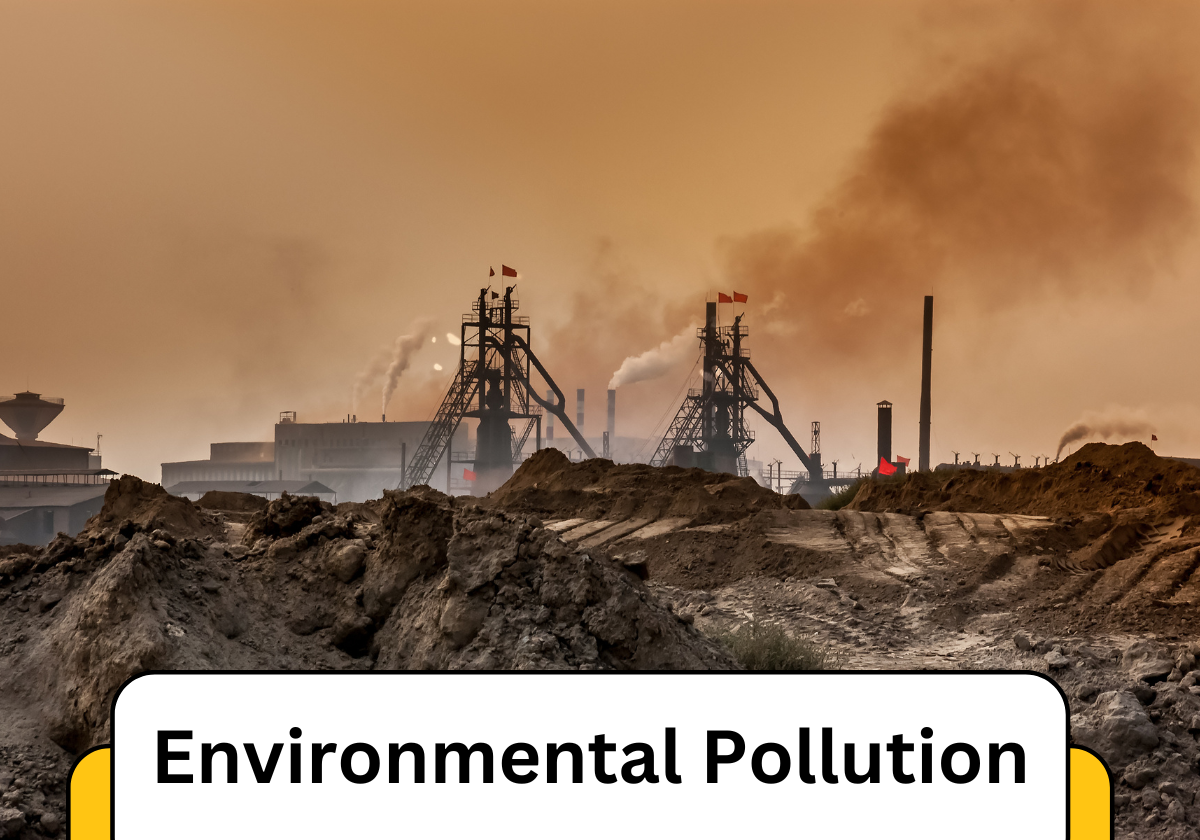An Overview
Environmental pollution is a major problem all around the globe today. It causes the destruction of natural resources like water, air, soil, and plants due to anthropogenic activities. Pollution impacts human health, climate, and biodiversity. Every form of life is impacted, and if left unchecked, global pollution could cause devastation to the Earth. This essay covers the definition, reasons, and consequences of pollution in detail, alongside ways to reduce it to restore a cleaner world.
What do we regard as being Environmental Pollution?
When an environment becomes infested with dangerous contaminants or substances that are potentially harmful to people and other living organisms, it is famously known as environmental pollution. These contaminants could come from industrial factories, car emissions, chemical waste, and much more. Major forms of pollution include air, water, soil, and noise.
Air Pollution
Air pollution, commonly found in urban areas, is the most reported type of pollution. It stems from the presence of hazardous gases and particles in the air, which is a result of the following:
- Gas emissions from vehicles
- Smoke produced by industries
- Use of nonrenewable fuels
- Deforestation/Wild Fires
- Air Pollution results in respiratory diseases, acid rain, and the alteration of weather patterns.
Water Pollution
Water pollution refers to the degradation of water bodies like lakes, rivers and oceans by waterborne pollutants like:
- Waste chewing
- Chemical and plastic Waste Disposal
- Oil Pollution
- Runoff Water From Agriculture (Herbicides and Fertilizers)
Polluted water results in the death of marine organisms, waterborne diseases and inadequate supply of clean drinking water.
Soil Pollution
Soil pollution takes place when soil is contaminated with harmful chemicals, waste and pesticides. Some reasons are given below:
- Overuse of Chemical Fertilizers and Pesticides
- Dumping Industrial Waste
- Deforestation and Land Abuse
- Soil pollution influences agriculture, food security and the growing of plants.
Noise Pollution
Noise pollution is created by excessive and unregulated sound from vehicles, industries and urban centres. It creates:
- Stress
- Hearing Difficulties
- Disruption of wildlife
Plastic Pollution
The uncontrolled disposal of plastic products presents a danger to the ecological balance. Single-use plastic products take hundreds of years to biodegrade, resulting in the following:
- Pollution of Sea
- Dangerous Effects on Land Animals
- Contamination of Soil and Water
Causes of Environmental Pollution
Some of the major contributing factors towards environmental pollution are:
1. Industrialization
Uncontrolled growth of industry results in higher emissions of harmful gases and the disposal of toxic waste along with deforestation for new factories.
2. Urbanization
Increasing population leads to excessive expenditure on landfilling, traffic control measures, and clearing of forests for new settlements and services.
3. Deforestation
Cutting down trees contributes to climate change and reduces the amount of oxygen in the air. Trees help absorb carbon, and removing them results in greater greenhouse gases.
4. Excessive Use of Plastics
Plastics are non-biodegradable and are one of the leading contributors of pollution to the environment.
5. Burning Fossil Fuels
The use of coal, petrol, and diesel will always contribute to emissions and climate change.
6. Lack of Waste Management
The careless management of industrial and domestic waste increases the pollution of water and soil.
Effects of Environmental Pollution
Pollution has adverse and far-reaching consequences for human beings, wildlife, and the environment.
1. Health Issues
Besides causing health problems like asthma, water and air pollution can also lead to severe health problems like:
- Destruction of lungs
- Heart and kidney problems
- Cholera and typhoid
- Cancer from hormone disruptors
2. Climate Change
The emission of greenhouse gases controls global temperatures, causing:
- Increase in the levels of oceans and seas
- Increasing intensity of weather events,s including heatwaves, floods, storms
- Loss of polar ice caps
3. Extinction of Wildlife
The loss of biodiversity is caused by animals and sea creatures who suffer from plastic and chemical pollution.
4. Economic Loss
The unstable economy is heavily fuelled by pollution in agriculture, fishery and the travel industry.
Ways to Reduce Environmental Pollution
To limit environmental pollution, self-dedication and hard work from the individual level as well as from the government and businesses is essential.
- Renewable Energy Promotion
The utilisation of fossil fuels can be reduced,d and pollution may be lessened by adopting solar, wind, or hydroelectric energy.
- Less Plastic Consumption
- Stopping the use of single-use plastic.
- Adopting materials that can decompose.
- Promoting recycling and proper disposal practices.
- More Trees
Afforestation and reforestation reduce the amount of carbon dioxide in our atmosphere, resulting in less global warming.
- Public Transport System
Carpooling, bicycles, and electric cars can help reduce the amount of pollution in the air.
- Regulations On Industries
These policies will result in tougher laws regarding pollution for different industries to avoid dumping waste into the air and rivers.
- Managed Water Resources
Controlling water pollution by stopping industrial wastes in water bodies, conserving water at home, and practising eco-friendly agriculture.
- Education And Awareness
People need to be made aware of the consequences of pollution so that they are encouraged to practice sustainable living.
Government Schemes For Pollution Control
Some governments have set up new schemes to cater for pollution, such as the following:
- Clean India Mission
A national campaign that seeks to improve the standards of cleanliness, waste management, and sanitation at the national level.
- Plastic Ban Legislation
Countries have started the practice of banning the use of single-use plastic to help mitigate pollution caused by plastic.
- Paris Agreement
A legally binding international treaty on climate change to limit the increase of global warming.
- Projects that utilise Renewable Sources of Energy
The government is spending on solar, wind and hydro energy in place of fossil fuels.
Pollution of the Environment is one of the most serious problems of mankind, nature and wildlife and needs to be tackled immediately. Therefore, it is compulsory to have a policy in place by the governments, enforcement of laws at the industrial level, and awareness at the general public level. Certain actions can have a huge positive effect on the environment, and these include using less plastics, shifting to renewable sources of energy, and planting more trees. We have to act responsibly today so that we can have a clean, green, and healthy world tomorrow.
Last Remarks
By each and everyone doing their best in waste management as well as energy conservation, and employing a sustainable manner of living, it is possible to achieve a world without pollution. Let us all do our part to help the cause! 🌍

